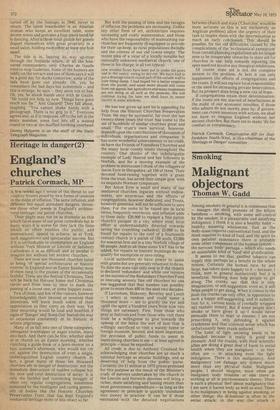Letter from Picardy
Before the tourists
Danny Halperin
Since the nights of May 20 and 21, 1940, when a few of General Guderian's men indulged in a minor shooting spree along the quais, nothing much has happened at St Valery-sur-Srmme except for a flourish of intense but brief fighting when they departed in mild moonlight on the night of September 1, 1944. The tourists began returning in 1945, at first mainly avid marshland hunters, stomping in their stained hipboots through the small dining-room of the Hotel Colonne de Bronze which was listed as long ago as the 1923 Guide MiChelin as the only local inn worth mentioning.
Hunters and history are St Valery's yearround stock-in-trade. Only from mid-July to end-August do the conventional tourists, mostly French, swell the population from its usual 3,262 to a summer high of 12,000. It is that relative rarity, a town which has been classified in its entirety as a French National Historic Site,' all the way from the marble reminder on the incoming road that William the Conqueror sailed his bristling boats from here to beat the English in 1066 to the engraved stone slab on the old town walls that remembers this as one of the many places, including Le Crotoy across the bay, to which those English shunted Joan of Arc before her smelly finale at Rouen. Hunters do not bother with historic notices. At still-dark dawn they clump into the steamy tabac on the main street where, ranged beside the Voltigeur cigars and the subtle blues of Gitanes and Gauloises, tpey can stock up with cardboard containers of shotgun cartridges from 9.50 f,rancs each. After a calvados-laced black coffee, thick with sugar lumps that spill it over into messy saucers, they are off in mud-spangled 2cv's to soak their butts in the duck blinds that dot the marshes of the broad Somme estuary, returning for late, long, oyster-diminishing lunches — often with nothing more to show for their efforts than an empty cognac flask.
The church bell tolls. Why is it doing that in the middle of the afternoon? "Henri got his yesterday," the owner of the tabac explains. "When you misjudge how fast the tide is coming in and it creeps over the top Of your hip boots there is nowhere to go but down. It happens all the time — oh, at least once a month. No one believes it can happen to them. So it happens to them."
There are three mourners only, three women with sleep-lined faces getting out of the taxi that brought them from Abbeville to line themselves up awkwardly behind the hearse for their short walk up through the eleventh century door of the church. Later they sit in the tabac drinking sticky Suze and one of them professes profound puzzlement over the price of leeks.
The locals do not talk about Guderian or Joan of Arc. Their subject is the rapid rise in meat and fish prices when they are not talking about the strange way migrating birds turned back north so very early this year. A man says, "I saw three flocks flying north at Christmas time." Others tell similar stories. They find this genuinely disturbing. And where has all the honey gone? There is not one jar in any of the stores except for a single pot of it at the patisserie. "She wants almost teh. francs for that pot. It is ridiculous. And it is not even French honey. It comes from Hungary." In the evening there is a wedding banquet at the 'new' hotel, a massive mess of turrets, balconies and gables built by a wealthy English couple in the 1890s, whose descendants were carted off by the Gestapo in 1940, never to return. The latest leaseholder is an Alsatian woman who keeps an excellent table, some decent wines and provides a four-piece band for le dancing. After a three-hour guzzle her guests disport themselves with great propriety in a small salon, holding each other at least one foot apart.
The tide is in, lapping its way up-river through the flatlands where, of all the honoured commanders, only Charles de Gaulle tried to stop Guderian. Some of the hunters are Oddly on the terrace and one of them says it will be a good day for ducks tomorrow; some of the lads have gone out already. Oh, yes, he remembers the bad days but sometimes — and this is strange, he says — they seem not so bad. Oh, yes, he shook hands once with de Gaulle. "He could not help us now. Things have gone much too far." And Giscard? They fall about, laughing. "You cannot shake hands with a photograph. There is no grip to it." Everyone agrees and, as if in response, off to the left in the misty marshes, some fool lets off a wasted round or two at the muffled honking overhead.
Danny Halperin is on the staff of the Daily Telegraph Magazine.











































 Previous page
Previous page